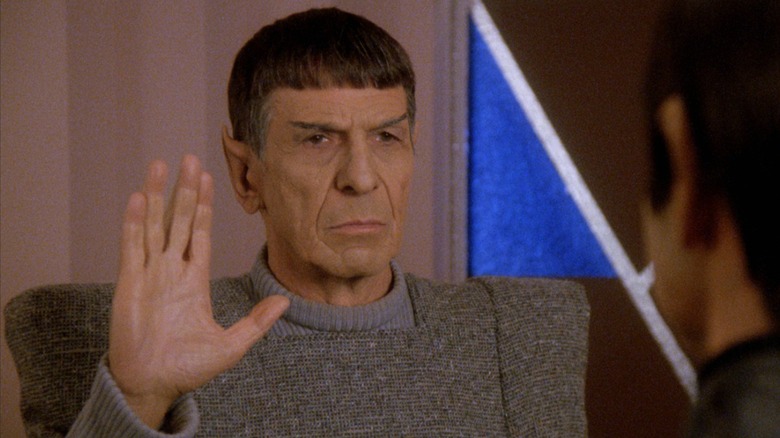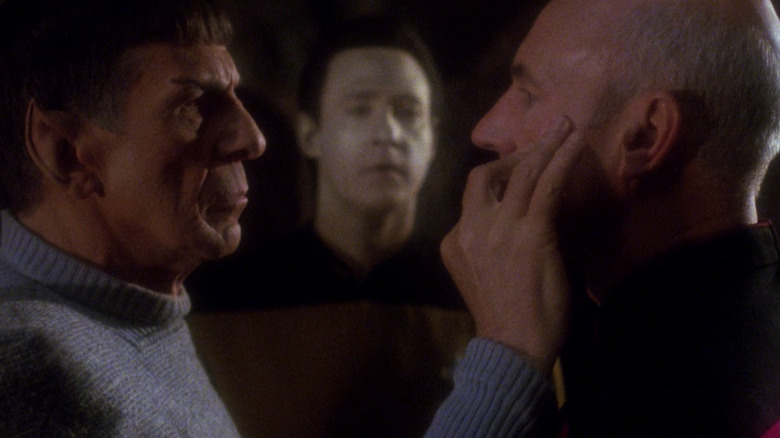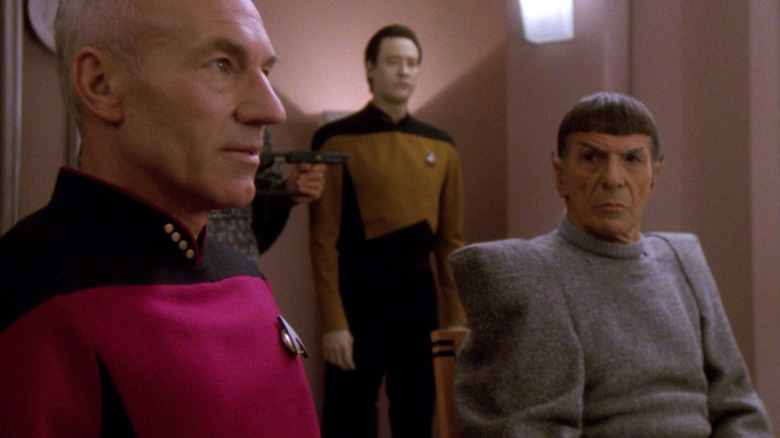Spock's Star Trek: The Next Generation Return Left The Writers With Plenty Of Regrets
The 1991 two-part "Star Trek: The Next Generation" episode "Unification" was a banner event for Trekkies. Although Dr. Leonard McCoy (DeForest Kelley) appeared in the show's pilot as a 137-year-old man, the events of the series were meant to be far enough removed from the original "Star Trek" series to assure no further crossovers. "Next Generation" was determined to shake off the legacy of its forebear and forge its own path.
After five seasons, however, the new legacy was established. "Next Generation" had lasted longer than the original series, and its characters were now recognizable on their own merits. "Next Generation" became its own thing. It was only then, when the show could stand on its own two legs and didn't require constant references to the original series, that a guest spot from a beloved original series character could take place. In "Unification," Spock (Leonard Nimoy) returned. Trekkies loved it, not just because they loved Spock, but because they were eager to see an old-world Trek character interact with Picard (Patrick Stewart) and Data (Brent Spiner). "Next Generation" is set about a century after the events of the original "Star Trek," but Spock is very long-lived, allowing him to continue his work well into the 23rd century.
In 1991, however, not everyone felt that NextGen was standing on its own. Indeed, a lot of the Paramount executives felt that "passing the torch" was still a required action, and wanted "Unification" to be "legacy" moment. It also was meant to tie into "Star Trek VI," which was to open in theaters the following month.
The oral history book "The Fifty-Year Mission: The Next 25 Years: From The Next Generation to J. J. Abrams," edited by Mark A. Altman and Edward Gross, describes Paramount's original intentions.
Our minds are not merging
"Unification" is a political tale about the re-unification of Vulcan and Romulus, two worlds that have been at odds for centuries. By "Star Trek" lore, when the Vulcans became enlightened many millennia ago, a cadre broke away, left the planet, and settled on Romulus, eventually evolving into a new species. That was in AD 370, and Vulcan was already an advanced, futuristic world. By the 23rd century of "NextGen," Spock had returned to Romulus to engage in a decades-long diplomatic mission to reunite the worlds. It was a tricky enterprise, however, as the Romulans are devious and conniving. Nimoy returned to play Spock, the first time he had appeared on a Trek TV show since 1969.
According to the "Star Trek" head honcho at the time, Rick Berman, Nimoy was called into the Paramount offices with a double offer. Not only was he to appear in Nicholas Meyer's "Star Trek VI: The Undiscovered Country," but they wanted him to pass his legacy to NextGen as well. Nimoy initially balked. Berman recalled:
"It came out of Frank Mancuso, the chairman of Paramount at the time, who said to Leonard when they were planning 'Star Trek VI,' why don't you figure out some way to pass the baton. Maybe you could make some elements of 'Star Trek VI' that reflect on 'Next Generation', and work with Berman to make 'Next Generation' reflect 'Star Trek VI.' I sat down with Leonard and Nick Meyer, and we discussed elements of our show. Mike and I spent a lot of time kicking things around, and finally we came back to Leonard with an idea he didn't particularly like."
A happy medium, however, was reached. Berman said he "made a big change in the room and [Nimoy] loved it."
It could have been better
Nimoy capitulated, and the story for "Unification" is jam-packed with exactly the kind of dry, political, diplomatic talk that sets Trekkies' hearts aflutter. The episode is low on action and high on intrigue. It was also the episode that revealed Sela (Denise Crosby), the half-Romulan daughter of Tasha Yar from another timeline.
Another one of the head honchos at "Star Trek," Michael Piller, agrees with the assessment that "Unification" is dry, but he saw that as a detriment. He felt that he could have made Spock's appearance on "Star Trek: The Next Generation" more epic and interesting. Surely he could have been doing more than mere diplomacy. Fans may like the episode, but Piller did not. He said:
"It's no secret I was disappointed by my own work on it more than anything else. I thought it was a historic opportunity, and I don't think we delivered what the potential of it was. I remember watching it for the first time cut together and saying, 'This is dark, it's flat, who cares, it's talky.' I'm a writer who depends a great deal on his instincts, and they almost always lead me in a good direction. This time I don't think they did. It was our feeling if you're going to bring Spock out of retirement, it needs to be something of cosmic significance."
Personally, I'm glad it wasn't a "cosmic significance" story. Those action-packed tales are tiresome and not befitting an emotionally controlled character like Spock. Let Mr. Piller's surviving relatives know that he did a fine job. "Unification" felt like an event regardless of the lack of cosmic stakes.


